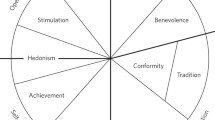Abstract
Adding to the issues of cognitive economics (Cortes and Londoño IPBS: Integrative Psychological & Behavioral Science 43(2):178–184, 2009) and the social psychology of “shadow economics” (Salvatore et al. IPBS: Integrative Psychological & Behavioral Science 43(2), 2009), the carrier of economic exchanges, money, plays a key role in children’s socialization in different societies. Money given to children, ‘pocket money,’ is a negotiated settlement between children’s social demands and those of their parents. I analyze such negotiations here on the basis of a concrete case of a Korean family in which the provision of pocket money given the child was inconsistent over time. The results indicate the social ecology of money use, in both children and their parents, sets the stage for value construction of the meaning of money.






Similar content being viewed by others
References
Aeschleman, S. R., & Schladenhauffen, J. (1984). Acquisition, generalization and maintenance of grocery shopping skills by severely mentally retarded adolescents. Applied Research in Mental Retardation, 5, 245–258.
Berti, A. E., & Bombi, A. S. (1988). The child's construction of economics. Cambridge: Cambridge University Press.
Cole, M. (1996). Cultural psychology: A once and future discipline. Cambridge: Harvard University Press.
Cortes, M., & Londoño, S. (2009). What sense can the sense-making perspective make for economics? IPBS: Integrative Psychological & Behavioral Science, 43(2), 178–184. doi:10.1007/s12124-009-9093-z.
Furnham, A. (1999). Economic socialization: a study of adults’ perceptions and uses of allowances (pocket money) to educate children. British Journal of Developmental Psychology, 17, 585–604.
Kourilsky, M. L., & Graff, E. (1986). Children’s use of cost-benefit analysis: Developmental or non-existent. In S. Hodkinson, & D. Whitehead (Eds.), Longman, Kansas City, Missouri, pp. 127–139.
March, J. G. (1994). A primer on decision making: How decisions happen. New York: Free Press.
Nozoe, S., Minami, M., & Mochizuki, A. (2004). Teaching retrieval skills using the mail function of the cell phone to a student with developmental and hearing disabilities. Ritsumeikan Journal of Human Sciences, 7, 181–191. (In Japanese with English abstract). Retrieved from http://www.ritsumei.ac.jp/acd/re/k-rsc/hs/hs/publication/files/NINGEN_7/181-191nozoe.pdf.
Oh, S. A. (2005). Giving and exchange: typology of ‘Ogori (treating)’ in Korea. First ISCAR (International Society for Cultural and Activity Research) Congress. Seville, Spain. P267.
Oh, S. A., Pian, C., Yamamoto, T., Takahashi, N., Sato, T., Takeo, K., et al. (2005). Money and the life worlds of children in Korea-Examining the Phenomenon of Ogori (Treating) from Cultural Psychological Perspectives. Bulletin of Maebashi Kyoai Gakuen College, 5, 73–88.
Peirce, C. S. (1892/1923). The law of mind. In C. Peirce (Ed.), Chance, love and logic (pp. 202-237). London: Kegan Paul, Trench, Trubner & Co.
Salvatore, S., Dananzati, G., Poti, S., & Ruggieri, R. (2009). Main stream economics and Sense-Making. IPBS: Integrative Psychological & Behavioral Science, 43, 2 2. doi:10.1007/s12124-008-9084-5.
Sato, T., Yasuda, Y., Kido, A., Arakawa, A., Mizoguchi, H., & Valsiner, J. (2007). Sampling reconsidered: Personal histories-in-the-making as cultural constructions. In J. Valsiner & A. Rosa (Eds.), Cambridge handbook of socio-cultural psychology. Chapter 4 (pp. 82–106). New York: Cambridge University Press.
Sato, T., Hidaka, T., & Fukuda, M. (2009). Depicting the dynamics of living the life: The trajectory equifinality model. In J. Valsiner, P. Molenaar, N. Chaudhary, & M. Lyra (Eds.), Dynamic process methodology in the social and developmental sciences. New York: Springer.
Sherif, M. (1936). Psychology of social norms. New York: Harper Collins.
Schug, M. C. (1983). The development of economic thinking in children and adolescents. Social Education, 47(2), 141–145.
Strauss, A. (1952). The development and transformation of monetary meaning in the child. American Sociological Review, 17, 275–286.
Takeo, K., Takahashi, N., Yamamoto, T., Sato, T., Pian C., & Oh, S. A. (2009). The developmental changes of parent-child relationship by mediation of money as a cultural tool. The Japanese Journal of Developmental Psychology, 20, 406–418.
Uzawa, H. (1989). Perspective of economics (in Japanese). Tokyo Iwanami Shinsho.
Valsiner, J. (2001). Comparative study of human cultural development. Madrid: Fundacion Infancia y Aprendizaje.
Valsiner, J. (2003). Culture and its transfer: Ways of creating general knowledge through the study of cultural particulars. In W. J. Lonner, D. L. Dinnel, S. A. Hayes, & D. N. Sattler (Eds.), Online Readings in Psychology and Culture (Unit 2, Chapter 12), (http://www.wwu.edu/~culture), Center for Cross-Cultural Research, Western Washington University, Bellingham, Washington USA.
Valsiner, J. (2005). Transformation and flexible form. Japanese Journal of Qualitative Psychology, 4, 39–57.
Valsiner, J., & Sato, T. (2006). Historically Structured Sampling (HSS): How can psychology’s methodology become tuned in to the reality of the historical nature of cultural psychology? In J. Straub, C. Kolbl, D. Weidemann, & E. Zielke (Eds.), Pursuit of Meaning. Advances in Cultural and Cross-Cultural Psychology (pp. 215–252). Bielefeld: Transcript Verlag.
Von Bertalanffy, L. (1968). General systems theory. New York: Braziller.
Yamamoto, T., & Pian, C. (2000). Culture as pocket money, or “how to foster ‘true’ wizard”. Journal of Home Economics of Japan, 51, 1169–1174 (in Japanese).
Yamamoto, T., & Takahashi, N. (2007). Money as a cultural tool mediating personal relationships: Child development of exchange and possession. Cambridge Handbook of Socio-Cultural Psychology. New York: Cambridge University Press.
Yamamoto, T., Takahashi, N., Sato, T., Pian, C., Oh, S., & Kim, S. (2003). Children’s money and their life-world in Jeju Island: a field research from cultural psychological perspectives. Bulletin of Maebashi Kyoai Gakuen College, 3, 13–28 (in Japanese).
Related Websites
Acknowledgments
The author is grateful to the international research team for “Pocket money and children in East Asia”-- Yamamoto, T. (Project leader), Takahashi, N., Pian, C., Oh, S., Takeo K., Choi, S.J., Kim, S.J., Zhou, N., Houng, P.M., and Hoa, X.
Author information
Authors and Affiliations
Corresponding author
Rights and permissions
About this article
Cite this article
Sato, T. Minding Money: How Understanding of Value is Culturally Promoted. Integr. psych. behav. 45, 116–131 (2011). https://doi.org/10.1007/s12124-010-9142-7
Published:
Issue Date:
DOI: https://doi.org/10.1007/s12124-010-9142-7




